Learn about the intriguing biblical significance of 'cud' and its link to ancient dietary laws in this enlightening exploration.
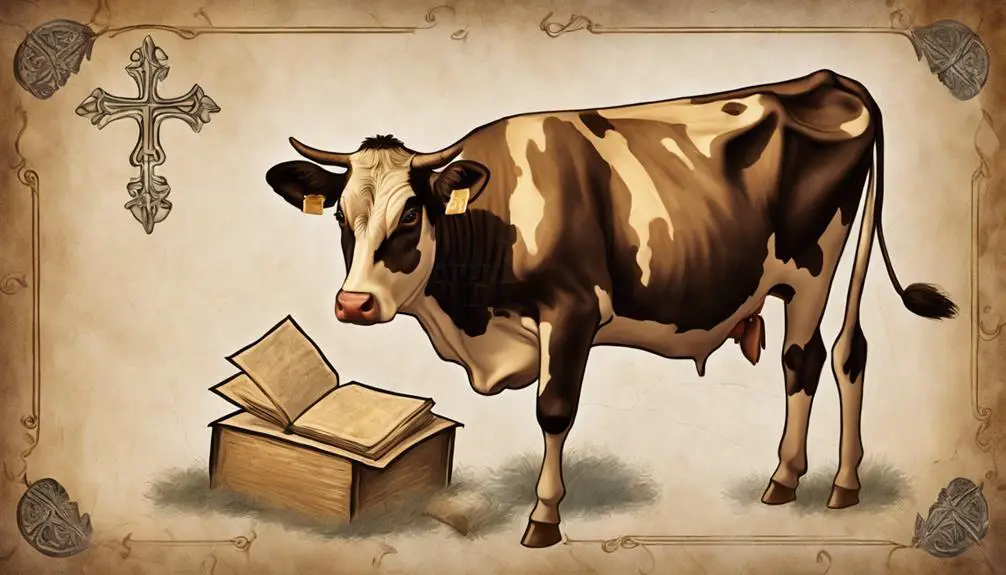
What Is Cud in the Bible
Just as Noah differentiated clean from unclean animals aboard his ark, you too might have wondered about the significance of 'cud' in biblical terms. In the Bible, cud refers to a portion of food returned from a ruminant's stomach in the mouth to be chewed for the second time.
But why does the Bible mention cud at all, especially in the context of dietary laws? What symbolic meanings are attached to it? There's more to explore, and the answers might surprise you.
Key Takeaways
- Cud refers to regurgitated food re-chewed by ruminants, symbolizing meditation on God's word in biblical context.
- Animals that chew cud and have divided hooves are considered 'clean' in biblical dietary laws.
- Non-cud-chewing animals, like pigs and rabbits, are deemed 'unclean' according to these laws.
- Beyond dietary rules, cud-chewing metaphorically signifies absorbing and integrating divine wisdom, emphasizing spiritual reflection.
Understanding the Term 'Cud
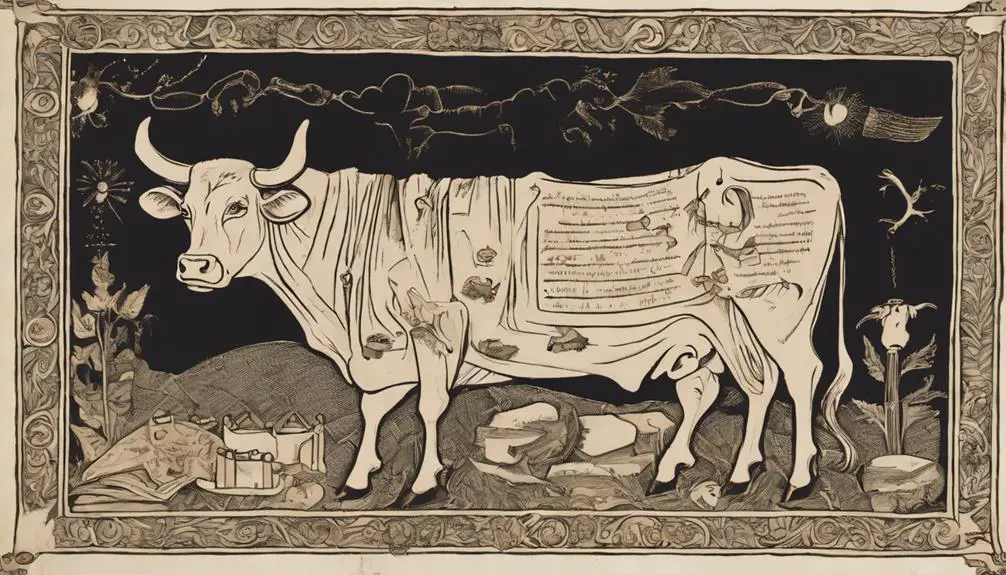
Before delving into the biblical context, it's crucial to understand what 'cud' actually means. The cud definition is quite straightforward: it refers to the semi-digested food that ruminant animals, like cows and sheep, regurgitate from their first stomach compartment to chew again. This process is essential to their digestion.
Now, let's explore cud's origin. The word 'cud' comes from the Old English 'cwudu', which means 'what is chewed again.' The term is deeply rooted in the behavior of ruminants, and it has been used for centuries to denote this specific aspect of their eating habits.
Understanding the definition and the origin of 'cud' provides a crucial context for its use in the Bible. It's not just a word; it's a concept tied to the natural world and the behaviors of certain animals. This understanding allows you to grasp the metaphorical and symbolic meanings that may be attached to it in biblical texts. Remember, to fully comprehend any term's usage, especially in religious or historical documents, you need to understand its basic definition and its roots. So, keep these points in mind as we continue to explore the term 'cud' in the Bible.
Biblical References to Cud
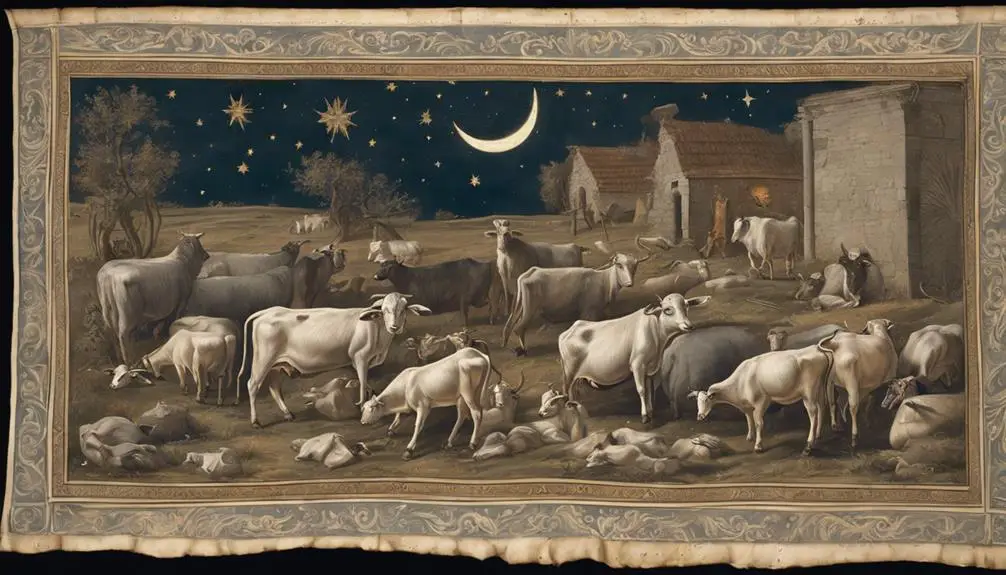
There are several instances in the Bible where the term 'cud' is used, primarily in the context of distinguishing between clean and unclean animals. You'll find this mentioned in Leviticus and Deuteronomy, where it's clearly stated that animals that chew the cud and have a divided hoof are considered clean.
The cud significance here is tied to the concept of purity and holiness. It's not merely about the physical act of an animal chewing its food. Instead, it's a symbolic representation of meditation on God's word. Just like an animal chews cud, believers are encouraged to 'chew' on the word of God, breaking it down and digesting it thoroughly.
Cud interpretations may vary, but most agree on its symbolic representation of spiritual nourishment. It's an interesting metaphor that conveys a deep spiritual truth. The cud-chewing animal ruminates, just as believers are meant to ruminate on God's teachings.
In essence, the biblical references to cud go beyond dietary laws, providing a spiritual lesson on how to approach the word of God. It emphasizes the importance of not just hearing God's word, but also meditating on it and internalizing it.
Cud in Dietary Laws
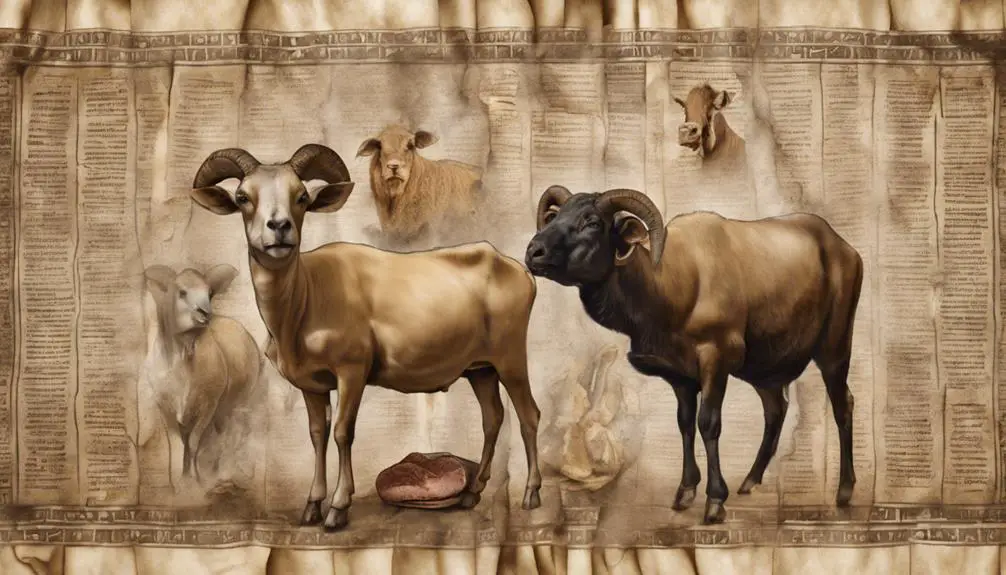
In relation to dietary laws, you'll find the concept of cud-chewing is quite significant. It's a key determinant in what the Bible deems as clean or unclean, influencing Cud Consumption Practices dramatically. This impacts both the physical and spiritual health of believers, leading to profound Dietary Implications.
The table below provides a quick reference to how cud-chewing affects the permissibility of consuming certain animals.
Animal Type |
Cud-Chewing Status |
|---|---|
Cow |
Cud-Chewer |
Sheep |
Cud-Chewer |
Pig |
Non-Cud-Chewer |
Rabbit |
Non-Cud-Chewer |
Cows and sheep, being cud-chewers, are considered clean and fit for consumption. In contrast, pigs and rabbits, while popular in many diets, are deemed unclean as they don't chew cud.
These dietary laws aren't arbitrary. They serve to draw clear lines between the sacred and the profane, the clean and the unclean. As you delve deeper into the Bible's dietary laws, you'll see that they're not just about physical health but spiritual well-being too. In essence, these laws reflect a divine concern for the entirety of human life – both physical and spiritual.
Keep this in mind as you explore the Bible's dietary laws and their implications.
Symbolic Meaning of Cud

Now, let's turn our attention to the symbolic meaning of cud in the Bible, which offers another layer of understanding to these dietary laws. You'll notice that cud symbolism is deeply intertwined with the act of chewing, offering profound spiritual insights.
The act of chewing cud, or ruminating, is often used as a metaphor for meditation and reflection on God's word. This is where the chewing significance comes into play. Just as an animal chews its cud, breaks it down, and absorbs its nutrients, so too are you encouraged to repeatedly 'chew' on God's teachings, breaking them down and absorbing their profound meanings.
Cud symbolism thus represents the process of internalizing divine wisdom. It's not merely about consuming God's word, but rather digesting it thoroughly, understanding its nuances, and integrating it into your life. This is a process of continual reflection and absorption, signifying a deep and ongoing relationship with God's teachings.
However, remember that these symbols shouldn't be taken literally but serve as teaching tools. They offer valuable insights into how you can approach your spiritual journey, emphasizing the need for deep reflection and understanding.
Cud's Link to Clean and Unclean Animals
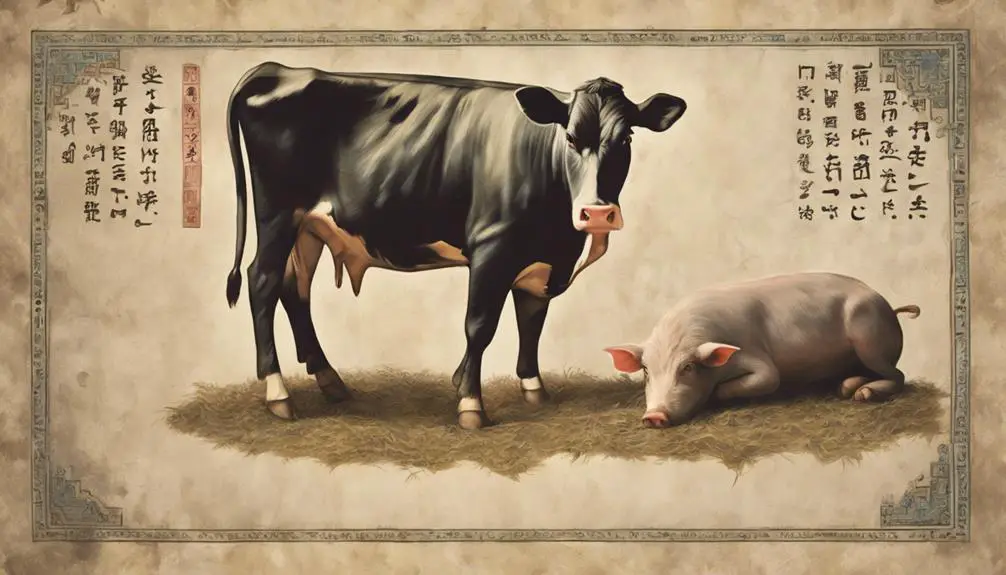
Delving into the concept of clean and unclean animals, you'll find that the act of chewing cud plays a significant role in this biblical classification. Animals that chew cud and have split hooves are considered clean and suitable for consumption according to the Bible. This understanding isn't just a dietary guideline but extends to the realm of religious rituals, where the cud becomes a symbolic marker of purity.
Analyzing cud's biological significance, it's the partially digested food regurgitated from an animal's rumen. This act of re-chewing allows for the further extraction of nutrients, enhancing the animal's survival. From a religious perspective, cud-chewing is seen as an act of meticulousness and patience, qualities often associated with purity in several cultures.
The biblical classification of clean and unclean animals using the cud is fascinating. It's a testament to the interweaving of cultural, dietary, and religious practices. As you navigate through biblical texts, you'll appreciate the complex role of cud in rituals and its biological significance in a new light. This is an essential step to understanding the broader context of religious dietary laws in the Bible.
Frequently Asked Questions
What Are Some Other Biblical Terms Similar to 'Cud'?
You're asking about biblical terms similar to 'cud'. Other terms with symbolic nature like 'cud' include 'manna', representing divine sustenance, and 'lamb', symbolizing innocence and sacrifice.
'Cud' references in the Bible are often linked to clean and unclean animals, guiding dietary laws. These terms all carry deeper meanings, contributing to the rich symbolic layer of biblical narratives.
Are There Any Controversies or Debates Related to the Biblical Interpretation of 'Cud'?
Yes, there are debates about Cud's symbolism and implications in the Bible, specifically regarding dietary laws. Some argue that cud-chewing creatures symbolize contemplation and meditation, while others focus on the literal interpretation, viewing it as a dietary restriction.
The interpretation can vary between different sects and translations, leading to ongoing discussions and diverse views. It's essential to approach these debates with an open mind and respect for differing beliefs.
How Has the Understanding of 'Cud' Evolved Over Time in Different Religious Sects?
You've noticed that understandings of 'cud' have evolved diversely among religious sects. Some view 'cud' as a symbol of meditation on God's word. Yet, 'cud' in prophecy might suggest a call to ruminate on future events.
Interpretations vary, reflecting the complex nature of biblical exegesis. So, in your exploration, you'll encounter diverse perspectives that enrich your contemplation of the 'cud' symbolism and its prophetic significance.
Are There Any Specific Events or Parables in the Bible Where 'Cud' Is Mentioned?
You're asking about specific instances where 'cud' is mentioned in the Bible.
It's often used in laws regarding clean and unclean animals. For example, Leviticus 11:3-8 discusses animals that chew the cud and have a divided hoof.
The cud symbolism here is tied to cleanliness and dietary rules. This has immense cultural relevance, particularly in Jewish and Christian dietary laws.
What Is the Significance of 'Cud' in the Bible in Relation to Other Religious Texts?
You're examining cud's symbolism in the Bible compared to other religious texts. In the Bible, cud is significant in religious dietary laws. Animals that chew cud are deemed clean, symbolizing purity and righteousness.
This differs from other texts where dietary laws may not exist or differ significantly. Analyzing such comparisons can provide insight into the values and beliefs across various religious traditions.
Conclusion
So, you've delved into the term 'cud' in the Bible. It's not just a dietary guideline, but a symbolic tool.
Cud, mentioned in dietary laws, links to clean and unclean animals, shaping ancient Israelites' eating habits.
It's more than a mere biological function—it's a reflection of divine guidance. Remember, understanding these nuances can give you a richer comprehension of biblical texts.
Every word, even 'cud', holds weight in this sacred scripture.



Sign up